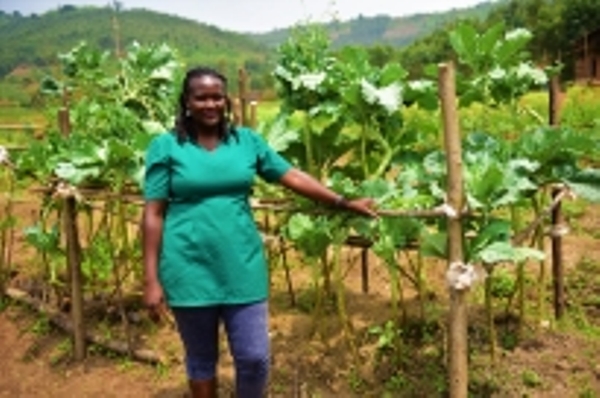
Juliette Yaramba in her vegetable field in Rulindo District. Through her company “Fresh Basket dlvd” supplies bio-organic fruits and vegetables. ©FAO/Teopista Mutesi
Kigali: Leaving your good job to engage in agriculture is not something really understood by many people particularly in countries like Rwanda, where agriculture still shares the unfair perception of being a burdensome sector with less rewards.
Juliette Yaramba is challenging this old mindset and she is paving new ways to inspire other young people.
Since 2016, she has been farming six varieties of fruits, vegetables, and spices on the family land in Masoro sector in Rulindo District. Her farm products are Boston, Catalogna, Grand Rapids, Lolla Rossa, Mix blend, Prizehead, Speckles, Swiss chard, Romaine, Borage, chervil, Ailciboulette, Parsley, Tat soi, radish, Amaranth, Pepper, and Rosemary.
Juliette grew up and studied in France, where she was trained as a technician in electro-technics. In December 2014 she left her job in Lyon, France where she has been working for over four years, to come and engage in agriculture in Rwanda, despite having no prior experience in the sector.
“My family and friends didn’t understand my decision, when I told them I was going to the rural Rwanda to start farming. They thought I had run mad,” says Juliette.
Most young people living in rural areas decide to move to the urban centers to look for a better life with a ‘good’ job. Some end up doing backbreaking activities like pottery in urban centers when they could actually be more productive with the land back home for agriculture production.
Currently, Rwanda’s youth population accounts for 28 percent majority of which, are aged between 16-30 years and each year above 300 000 Rwandan youth seek to enter the country’s workforce, too many of whom without success.
Making it against all odds
Although Juliette had the passion and envisioned a profitable business in agriculture, she was taking a great risk to venture into a field she has less experience in. Juliette is also involved in poultry keeping as well with a stock of over 700 chickens.
“I relied mostly on the skills of small scale female farmers who had been cultivating the marshland. I also tried do research online on good agricultural practices. It was frustrating because I wasn’t getting the production I was targeting,” she says.
Through FAO’s capacity development initiative for farmers, Juliette was among ten farmers sponsored to undertake a three weeks training at Songhai center in Benin to improve their farming activities.
Gaining skills in integrated farming
At the center, she learnt hands-on ecofriendly agriculture techniques, management skills, bio organic transformation, postharvest handling, among others.
“I learnt that nothing is a garbage on the farm,” she says.
By-products generated by animals and dried plants – litter and droppings collected on farms – they are stored until they become composite raw materials. The composite is used to fertile the plants instead of chemical fertilizers.
“We have decided not to use chemicals in our agricultural activities. I aspire to practice a profitable, but sustainable farming, while being competitive,” she says.
Equipping other farmers
Through her company –fresh basket – now employs about 60 young farmers and women.
She is transferring everything she learned in farming to her employees to empower them to become modern farmers to tap into the immense wealth in agriculture.
“Agriculture is wealth because people cannot do anything if they don’t eat…everyone needs food,” she says.
From farm to market
Juliette has set up a market in town for her vegetables and chicken products.
Every Monday evening, she takes fresh vegetables and fruits right from her farm to the market to waiting clients.
“I have a huge market for my produces. Currently I supply a hotel that cooks food for the national carrier –Rwandair (national carrier) and high-end customers in Kigali,” she said.
She says her products are liked because they are bio-organic. Her vision is to establish a center to train farmers in integrated and sustainable agriculture. (End)
